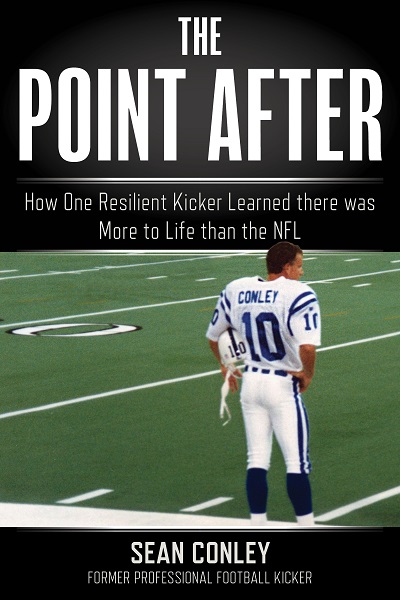
If you love the kind of book that follows the life of an underdog struggling to reach their dreams, The Point After will keep you turning pages. Conley has written his story, a true-to-life account that demonstrates how his values: confidence, learning how to lose, persistence, tenacity, risk, endurance, working smarter, and focusing on one’s successes not failures, can help a young boy reach his life-long goal, and teach a valuable lesson in the end because achieving your goals is never the end of the story.
I had to stop reading to wipe tears halfway through the book, it’s that emotional.
The Point After is an incredible look at football from the inside, giving exciting details about the ins and outs of a player’s life, especially the life and struggles of a kicker. We follow Conley from his youth with larger-than-life aspirations, his very human failures, and the struggles physically, emotionally and spiritually that he has to overcome. We share with him the feeling of aloneness as only he believes in himself to the joy of finding someone who believes in him, and on to overcoming disappointments.
He gets there. He achieves his dreams as anyone knowledgeable of NFL history knows, but then everything changes. His passion to become an NFL kicker diminishes when his new wife has a child.
AMAZON: https://www.amazon.com/-/es/Sean-Conley-ebook/dp/B086Y7Q25T
“I’ll be happy, I had always assumed, when I’ve become a stable NFL football player. Now I had an inkling that maybe happiness originated somewhere else entirely. Could it be that I’d find it not in my achievements, but in my ability to love?” – The Point After Conley pg. 199
Conley, knowing he has ADD, attributes his successes and his disasters to the overly focused aspect of his personality. He continues with his dream even after his marriage despite the fact he’s been injuring himself with his obsessive practice and determination. He pushes himself one too many times.
“There is an old Zen saying: let go or be dragged.” – Conley pg 227
And then life throws a curve ball and things change again. He has new obstacles to overcome and this time he’s ready. He’s grown, matured, learned from his past mistakes, and now has a helper, and a family to love.
I have read memoirs and autobiographies in the past, but The Point After is not just a journal or a diary about someone’s life. It’s about life itself. It’s about all our lives. We all have hopes and aspirations that we strive for, goals that we believe need reaching, passions that we obsess over and strive to fulfill. And at some point, we all bypass areas of our lives that should have made us slow down and ask “what is the meaning of all of this?” What am I doing? And will I regret what I’ve missed in the end? Unfortunately, sometimes we wait too long to answer those questions. I love Conley’s transparency. It is life changing. Reading The Point After cannot help but make us pause and think.
Dianne Gardner



























